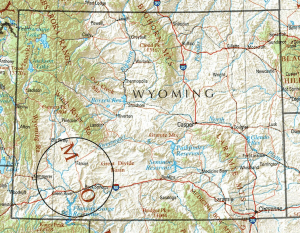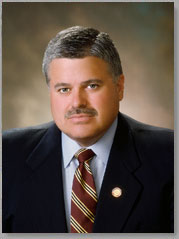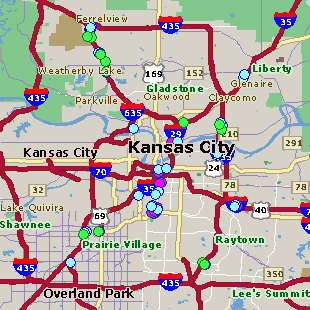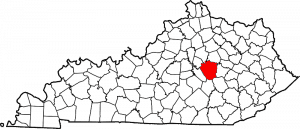Wyoming is one of America’s most broadband-challenged, least populated states. With just over 560,000 residents spread across its often mountainous terrain, broadband service is nothing to take for granted. Larger communities have limited access to Qwest DSL and cable broadband, but large sections of the state rely on independent wireless providers as their only choice, or they find no broadband service at all.
In this spartan digital world, many residents are surprised Wyoming is criss-crossed by national fiber-optic lines moving traffic across the country. It’s just that in most instances, individuals are not allowed to access it.
Wyoming.com, a privately-owned Wireless ISP, wants to expand service to Farson and South Pass City — two communities further north that have no hope of getting anything beyond dial-up or satellite fraudband service. The commercial provider, working with the administrators of the fiber network, has access to federal grant money to expand service to unserved communities, and improve it in underserved areas like Rock Springs. But that cannot happen if the venture is refused access to a 48-strand “middle-mile” fiber-optic line financed by public dollars and managed by the Joint Powers Telecommunications Board — a partnership between the Green River City Council and Rock Springs local government.
The notion Wyoming.com could get access to a taxpayer-financed network ruffles Tom McCullough, the city’s liaison to the Joint Powers board. He’s opposed to allowing any government resource to benefit the public at the expense of the local cable monopoly — Sweetwater Cable TV, which doesn’t even serve most of the areas that would benefit from enhanced Internet access. McCullough argues it violates a 2007 Wyoming law that prohibits public broadband projects when private providers provide access to similar services anywhere within the boundaries of a city or town. The law came in response to a public broadband project undertaken in Powell that upset the state’s cable and phone companies.
If residents want access to the fiber network they paid for, they have to visit Western Wyoming Community College or the Sweetwater County Library System and use public terminals there.
McCullough so dislikes the fiber project, he has tried to disband the Joint Powers Board that manages it twice, suggesting he has enough support to sell off the entire network to anyone interested (presumably at a substantial discount.)
Local residents who remain stuck with dial-up or who live outside of Sweetwater Cable’s service area are furious.
“There are some types around here who can’t see past Rush Limbaugh — anything the government does is automatically bad and must be taken down, even if taxpayers paid to build it in the first place,” complains Stop the Cap! reader Sue who lives in Farson. “Farson has nothing to do with Sweetwater Cable, but because a handful of politicians are looking out for the cable company, worried Wyoming.com is going to get one-up on them, that means we can’t have broadband.”
Steve Shea, chairman of the telecommunications board, is unimpressed with McCullough’s arguments as well, and accused him of allowing his personal friendship with Sweetwater Cable TV’s owner — Al Carollo — to cloud his judgment.
Shea says Wyoming’s local governments are often fiercely protective of locally-owned businesses, and told the Green River Star the Board has historically faced the attitude that “local business deserves a monopoly, no matter what.” Sweetwater Cable TV is locally owned and operated.
In fact, Shea says original designs for the fiber network were to provide fiber-to-the-home service in the area. Since a national fiber optic cable was already running adjacent to the community, getting a connection to it was relatively simple. Extending service to individual homeowners was another matter. Political opposition to “government broadband” and demagoguery about its cost and implications from private providers ultimately killed the project.
Shea documented his experience as commercial providers and their dollar-a-holler industry-connected supporters fought the fiber project:
- Opposition comes from everyone in the Telecom business;
- Opposition will be in your face constantly;
- Opposition will never run out of lies;
- Opposition is ready to strike at any time and at any place;
- Opposition will engage in back-room politics against you;
- Opposition will try to get Power Brokers and Influentials on their side;
- Opposition will spend as much money as needed to defeat you.
As Wyoming’s broadband rankings slip further and further behind much of the rest of the country, Shea hopes attitudes about the fiber network have changed, especially when residents learn Sweetwater Cable was offered access to the network as well, and they declined.
Shea shared that the long history of opposition to the project started with suggestions wireless broadband was better than fiber, or that broadband over power lines could do the same or better than fiber networks. He even battled contentions that existing broadband networks provided “fast enough” service for Wyoming. Today, it has extended to allowing a private company to engage in a public-private partnership. The other providers are still opposed.
“You have to refute these arguments over, and over, and over again. Your opposition will oppose you at every corner, and will call in all of their political favors to derail your fiber project,” Shea writes.
“It’s Wyoming’s version of North Carolina,” Sue writes from her Hughes Satellite address. “Sweetwater Cable doesn’t want access to the fiber themselves, and they want to make sure you don’t access it either, even though the family I have down there tells me their cable Internet service sucks because the cable company can’t handle the traffic.”
Sweetwater Cable gets their access from Qwest.
What bothers Sue and some other local residents about the squabble is that it is inherently political and allows an existing, underutilized fiber line to sit mostly unused when expanded broadband is desperately needed in Wyoming. In fact, some consider it a scandal among special interests.
“They don’t care about better broadband — they only care about their political and industry friends,” Sue complains. “When will people wake up and realize that whether it is North Carolina or Wyoming, these policies and laws don’t give anyone broadband — they keep us from getting it.”
Shea’s observation that opponents’ use of backroom politics seems to have been right on point. On Tuesday, as the Board met to discuss Wyoming.com’s proposal, Shea was effectively forced out and announced his resignation after the owner of Sweetwater Cable TV said he contacted an attorney to look at whether Shea’s tenure on the board was legal.


 Subscribe
Subscribe









